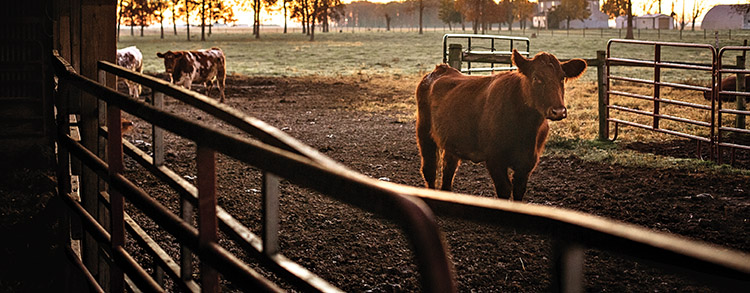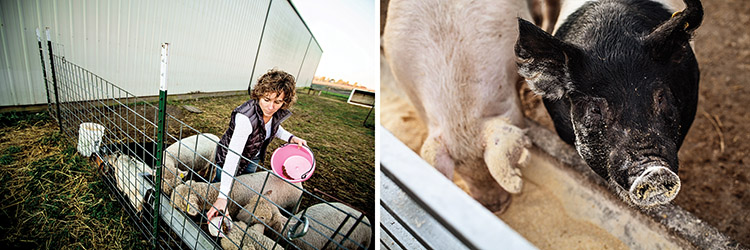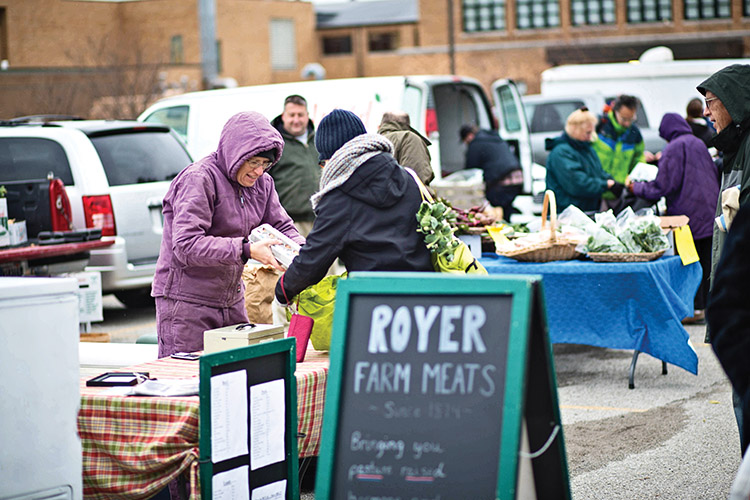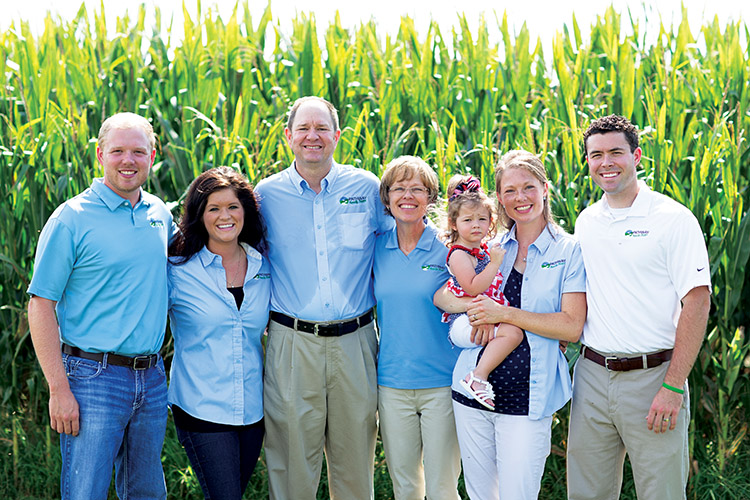Times are changing on traditional family farms and within the agriculture industry at large.
There’s certainly nothing new about the presence of hardworking women in an agricultural setting. On the farm, perhaps the quintessential family business, women and girls have long shared in the chores of planting, harvesting, and livestock management. They also may have taken the lead on squaring accounts, teaching children, or figuring better ways to get beef, bacon, or crops to the market.

What may be changing, however, is the growing number of leadership roles that call upon a female perspective in farming and throughout the ag industry.
Industry transitions are often reflected on college campuses, which looks to be the case at Purdue and elsewhere. In fact, Tracie Egger (A’95, PhD EDU’09), assistant director of academic programs in the College of Agriculture, believes more women enrolling in agriculture programs is trending nationwide. “Other universities are seeing this, too,” she says. “At Purdue, women accounted for 62 percent of the entering 2016 class.”
What’s driving those numbers? “Opportunity,” Egger says. With more study and career options than ever before, ag students can build foundations from academic strong suits in the STEM (science, technology, engineering, and math), business, communication, and education fields. Likewise, students looking to make a greater global impact can address challenges that include world hunger, water quality, environmental sustainability, and economic adversity. The call to make a world of difference may be particularly appealing to young women.
To follow are three Purdue alumnae, all of whom have either returned to a family farm or started one of their own. Their impact, beginning with immediate family, spreads outward into communities. The farming life runs in their blood, in some cases for generations, yet these women are bringing a decidedly 21st-century approach to a business that brings food to tables.
Farming from scratch
Kristi (Krom) Kretzmeier (A’92) grew up on the northern Indiana farm her father still works. Even as an ag economy major, she longed for the great satisfaction that came from working outdoors to raise something — be it crop or livestock. “Every day is a different challenge,” she says. “I always wanted to work on a farm, but I didn’t know how I would do it.”

She found a way alongside John Kretzmeier (A’87), her classmate and future husband, who had not grown up on a farm. He became a first-generation farmer through perseverance and hard work, first serving as a hired hand for a local farmer, swapping labor for equipment before buying their own equipment. “We started by cash renting 200 acres and trading labor for equipment to farm the other farmer’s 200 acres,” she says.
Over the course of about 25 years, the Kretzmeiers’ Benton County farm grew from 400 to 4,000 acres. With corn and soybeans, along with a beef herd, they’ve passed the lifestyle down to three children who may or may not step into the family business. “We call the State Fair our summer vacation, and we just pull the trailer and take some animals with us,” Kretzmeier says of the family’s busy August.
In building a business from nothing, she and her husband have always made a good team. “He does most of the planting and harvesting, and I do all the bookwork, which is a full-time job, especially in winter. We both do some the of the marketing, as well as the physical labor.”
Though making a living from that hard work is often its own reward, Kretzmeier was honored with a 2009 Women in Agriculture Award from the Purdue Cooperative Extension Service. Created in 2005, these awards recognize women around the state in achievement and leadership categories. Kretzmeier earned the former for her help in building and maintaining those 4,000 acres.
For more than a century now, Purdue Extension has brought campus expertise into 92 Indiana counties to address the needs of families and communities. Danica Kirkpatrick (LA’00), engagement program manager, has worked at Purdue for more than a dozen years, serving on the Women in Agriculture team the past five years. In that role, she works with statewide extension representatives who bring critical agricultural programs to women. Through webinars and regional meetings, women receive both professional development and advice on work-family balance issues. “More and more women are stepping into primary and partnership roles on farms,” Kirkpatrick says. “They are dealing with banks and insurance companies.”
Higher education programs in agricultural management have prepared more women for the business of agriculture. Extension tools, one of which helps plan for passing down a family farm from one generation to the next after someone dies, offer pragmatic approaches on what to do. “We have an estate planning program and developed a tool for families called Code Red, which is essentially a one-stop shop for passwords, banking, insurance, and other essential information needed when there’s a family emergency,” she says.
Involved with Purdue Extension herself, Kretzmeier has taken an active role in her community, serving as a 4-H volunteer and sharing knowledge as a Purdue master gardener. As featured speakers in an advanced farming management class, the Kretzmeiers have even shared their success story with students.
Detours and direct marketing
Nikki Overpeck Royer (A’92) is a second-generation Boilermaker and a fifth-generation farmer. The Vermillion County farm in Clinton, Indiana, which dates back to 1874, had for three generations been a typical Midwestern farm with livestock and crops. Knic Overpeck (A’62), Nikki’s father, developed a purebred cattle business that focused on artificial insemination, embryo transfer, and showing. His successful breeding took him around North America as a showman and judge.

Like a lot of girls growing up in a business built around livestock, Royer learned the family trade and showed a lot of cattle. As she made her way through Purdue, however, the thought of full-time farming was not on her radar. She and her eventual husband, Scott Royer (A’92), planned to parlay their respective majors in biochemistry and animal sciences into industry careers. She earned a master’s degree in muscle biology at the University of Illinois and soon after landed a job in pharmaceutical sales; he went to work at Pfizer as a research assistant.
Her father’s sudden death in 2000 changed everything. “The cows needed to be fed,” Royer says of their decision to return to farming while maintaining full-time jobs. “We didn’t have kids at the time, so we went from very little free time to no free time at all.”
Scott took leave from Pfizer, and Nikki continued her full-time work off the farm as the couple combined technical smarts in a plan to reinvigorate the farm in instead of just maintaining it. Their small flock of sheep was proving not profitable, in spite of the challenges of finding good lamb in local groceries. With farmers’ markets on the rise, they started to take products directly to customers in 2003.
Today, as full-time farmers with twin seventh-grade boys, they sell beef, lamb, chicken, and pork from the farm-based Royer Farm Fresh store and at farmers’ markets in Broad Ripple, Fishers, and Terre Haute, Indiana. Additionally, by designing a social media marketing plan, Indiana customers also could order products through their website.
With the same entrepreneurial spirit that made them reconsider a business model to reach customers directly, the Royers turned their focus to sustainability. Their livestock, free from hormones and antibiotics, rotationally grazes pastures to minimize off-farm inputs and increase land productivity. With a meat processor within two miles, they focus on animals being “ready for market” year-round, so they don’t have to stockpile inventory.
The Royers’ success, another shot in the arm to a rural community, is part technology-inspired innovation and all hard work. Their businesslike approach — developed at Purdue and initially applied toward success in the industry sector — helped retool a family farm that could slip into the hands of twin brothers and a sixth generation over the next few decades.
From her academic post, Egger suggests the forward thinking preached in classrooms every day within the College of Agriculture, now the eighth-ranked such college in the world, propels that big vision. “It’s imperative that we stay abreast of trends in agriculture so that our students are prepared for success in their career journeys,” she says. “With researchers who are leading the spectrum in new agricultural techniques and science, we’re engaging students so they too can be at the forefront of what the agriculture future holds for them.”
2020 visions
Kretzmeier and Royer, both 1992 graduates, would never have used phrases like smartphones, laptops, and social media in their Boilermaker days. But they adapted to the changing landscapes that are now commonplace in today’s agriculture curriculum. Emily Hirsch Cooper (A’11) didn’t have that particular learning curve. She was already thinking like an entrepreneur when she made up her mind in her senior year to return to her family’s crop farm. After graduation, she joined forces with her parents, Mike and Beverly Hirsch, and brother, Jacob Hirsch, to create Pathway Family Farms in Fort Branch, Indiana. They raise corn, soybeans, and wheat in an area that includes parts of Indiana, Kentucky, and Illinois.

“Farms today are truly dynamic businesses that take many different skill sets to be successful,” says Cooper, who majored in ag business management. “That made joining the family farm business a perfect fit.” For her part, Cooper relies heavily on a business background by focusing on human resources, finances, revenue management, and business marketing. She credits the various campus organizations for helping her develop leadership experience alongside the demanding coursework. “Several of my upper-level ag classes challenged my thinking,” she says. “That was great preparation for thinking through everything related to running a business today.”
As for the high-stakes risks and rewards that accompany any business undertaking, Cooper says she couldn’t imagine it without the two-generation family dynamic. The shared perspectives of children in their 20s and parents in their 50s often lead to great insight.
“Working with the family is wonderful,” she says. “We’re all committed to the mission of Pathway Family Farms, and our weekly meetings create a communicative environment where everyone is heard.”
Cooper’s sentiments may be particularly reflective of women enrolling in Purdue ag programs today. “We pride ourselves on the numerous experiential and transformational learning opportunities available to students,” Egger says. “Having a resume that reflects personal growth and leadership development is the key to landing a job with a leadership role attached.”
A longtime leader in agricultural education, Purdue continues to extend that reach to the bigger world. Two World Food Prize Laureates, Phil Nelson (A’56, PhD A’67) in 2007 and Gebisa Ejeta (MS A’76, PhD A’79) in 2009, have further distinguished the program. For entering students, the chance to make impactful changes at community and worldwide levels can translate into a more meaningful passage from college to career.
Egger points to an ag “freshman factor survey” that shows incoming students most often choose a major because of parental and family influences.
“Parents want their daughters to find majors they enjoy and can be successful in. With 95 percent job placement for ag graduates, it’s becoming widely known that agriculture is no longer just about production and farming,” she says.
“From feeding hungry people in economically deprived nations to developing crops that withstand harsh environmental conditions to finding cures for devastating diseases, agriculture offers many opportunities for students to explore their talents.”
William Meiners (MFA’03) is a freelance writer.

